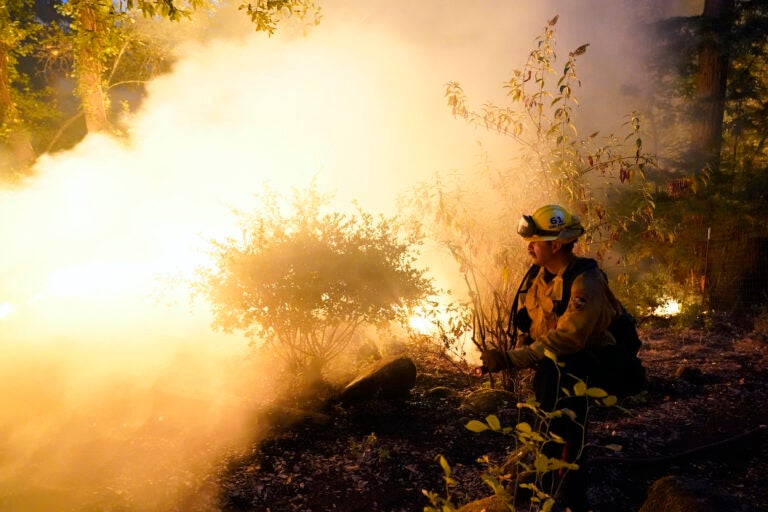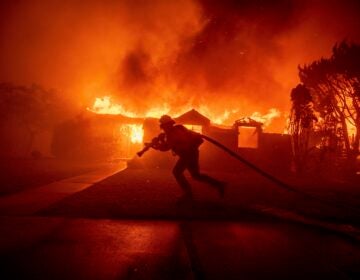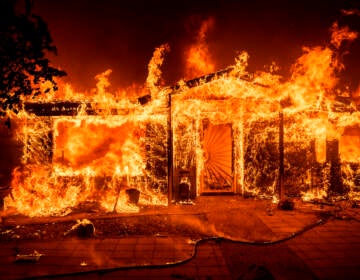Firefighting crews make slow progress with California fires
Two Bay Area clusters became the second- and third-largest wildfires in recent state history by size, according to state fire records.

Firefighter Jeremy Damon of the Nevada Yuba Placer Fire Dept. monitors a controlled burn in the backyard of a home in front of the advancing CZU August Lightning Complex Fire Friday, Aug. 21, 2020, in Boulder Creek, Calif. (AP Photo/Marcio Jose Sanchez)
Fire crews made slow progress Saturday battling some of the largest wildfires in California history — thanks to improved weather conditions and additional resources coming from others states.
But danger loomed with the threat of thunderstorms and lightning forecast for Sunday that could spark new fires and overwhelm firefighters battling hundreds of fires throughout the state.
“The worst is not behind us, we are in a battle rhythm,” California Department of Forestry and Fire Protection Chief Thom Porter tweeted.
Light winds, cooler and more humid nighttime weather and more equipment arriving for firefighters helped them make their most significant progress battling three massive Northern California fire “complexes” — multiple wildfires in one area being treated as a single incident. They have burned 1,045 square miles (2,700 square kilometers).
The fires that started this week have killed five people, destroyed nearly 700 homes and other structures and forced tens of thousands from their houses.
Containment for a fire that destroyed nearly 100 structures in the Santa Cruz mountains south of San Francisco grew slightly from 2% to 5%, and firefighters established a fire break aimed at protecting the evacuated University of California, Santa Cruz campus and the surrounding area.
“It’s not a silver bullet but it gives us a really good stronghold to keep the fire from moving south toward those communities,” CalFire Battalion Chief Mark Brunton said.
Statewide, there have been 585 fires over the last week — many sparked by thousands of lightning strikes — that have burned nearly a million acres, or 1,562 square miles (4,046 square kilometers), according to CalFire.
Many were small and remote. The bulk of damage was from three clusters of blazes that were ravaging forest and rural areas in San Francisco Bay Area and wine country north of San Francisco.
At least 100,000 people were under evacuation orders.
Two Bay Area clusters became the second- and third-largest wildfires in recent state history by size, according to state fire records. The third blaze cluster is in San Mateo and Santa Cruz counties.
Firefighters and aircraft from 10 states began arriving in California Friday to help the 13,700 firefighters on the lines. The National Guard was activated to provide support on the ground and in the air; the U.S. military supplied several water-dropping air tankers.
But firefighters’ efforts could be hurt by warm, dry weather the rest of the weekend and erratic gusts of up to 65 mph (105 kph) plus lightning in the forecast, officials said.
“All of our resources remain stretched to capacity that we have not seen in recent history,” said Shana Jones, the chief for CalFire’s Sonoma-Lake-Napa unit.
“We are making progress but we are not out of the woods,” she said.
Underscoring the danger the fires pose for firefighters, the Sonoma County sheriff’s office released dramatic video of the helicopter rescue Friday night of two firefighters trapped on a ridgeline at Point Reyes National Seashore. They were hoisted to safety as flames advanced.
“Had it not been for that helicopter, those firefighters would certainly have perished,” Sonoma County Sheriff Mark Essick said.

Get daily updates from WHYY News!
WHYY is your source for fact-based, in-depth journalism and information. As a nonprofit organization, we rely on financial support from readers like you. Please give today.





